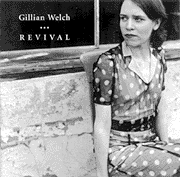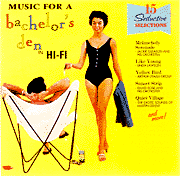

 Some years ago, while visiting my folks in Oklahoma City, I decided
to drive the seventy or so miles to my mother's hometown, Okemah. Some
ten miles outside that little burg, I stumbled across, while spinning
the car radio dial, the adept picking and close harmonies of classic
country music, as it was played in the thirties and forties. I'd found,
as it turned out, a pirate radio station.
Some years ago, while visiting my folks in Oklahoma City, I decided
to drive the seventy or so miles to my mother's hometown, Okemah. Some
ten miles outside that little burg, I stumbled across, while spinning
the car radio dial, the adept picking and close harmonies of classic
country music, as it was played in the thirties and forties. I'd found,
as it turned out, a pirate radio station.
This was no duly licensed commercial operation. It was clearly being run by a lone individual, a woman of some years who did her own announcing (in a distinctly untrained voice), cued up her own records (with mixed success; on at least one occasion, she played the wrong song) and composed her own advertisements even as she spoke them (I heard only two commercial announcements, both for a drugstore located on "Main Street," though the main street of which town, I know not. I somehow surmised that the broadcast was emanating not from Okemah but from some neighboring hamlet).
The music she played was by artists of whom I'd not heard but I recognized it as coming from an era, pre-Hank Williams and Ernest Tubb, when country music was a close cousin to folk music. It was as if I were a character in a Jack Finney short story, who'd somehow managed to pick up a sixty year-old radio broadcast. Sadly, after half an hour or so of sheer musical delight, I lost contact with the tiny station's signal as unexpectedly as I'd found it in the first place.
An individual who, by happenstance, comes across a broadcast of one of the more traditional tunes from Gillian Welch's debut CD, Revival, on Almo Sounds records, is likely to experience that same Finney-esque sense of floating through time that I did. This is country music as it's simply not made anymore.
Songs like "Orphan Girl" and "Only One and Only" will have many listeners assuming these are country standards, made famous originally, perhaps, by the likes of the Carter Family or Jimmy Rodgers. In fact, every tune on this disc is a Welch original, written, in some instances, with her writing partner, David Rawlings. A bit of a shame, this, as I'd pay a dear price to hear Patsy Cline's take on "Paper Wings" but now know not to hold out hope of some such recording being discovered in a storeroom or warehouse somewhere.
Welch's voice is not a terribly powerful one but it too evokes another era, particularly when engaged in close harmonizing with Rawlings. Her stylistic range extends from the sexy bluesy bad-girl shuffle of "Pass You By" to traditional country gospel stylings of "By The Mark". Her lyrics are at once straightforward and poetic. She writes of ballroom girls, adult orphans who still yearn for the bonds of kinship, grieving mothers, migrant farm workers and broken-hearted lovers and brings them all to life with an economy of expression that will break your heart. The album's instrumentation and production (at the hands of T-Bone Burnett), haunting in its spareness, serves Welch's voice, the lyrics and the tunes unwaveringly. With Revival, Welch puts the pretty-faced hat acts of today's country music to shame.
 I offer no scoop when pointing out that there's now an interest in a
whole range of odd pop music that has come to be labeled lounge or
exotica. These labels cover a huge spectrum of sounds, ranging from the
ridiculous to the sublime (and, occasionally, the sublimely ridiculous),
including everything from the outrageous, other-worldly sounds of
Esquivel to the gentle stylings (complete with jungle sound effects) of
Martin Denny, from the mambos of Perez Prado to the surf sounds of the
Ventures, from early, experimental recordings of Ferrante and Teicher to
the four octave vocal pyrotechnics of "Incan Princess," Yma Sumac. You
might be thinking of picking up one of the dozens of compilation discs
containing this material released in the last 12 to 18 months by any
number of record labels and, unless you plan on becoming a major
collection of this music, a compilation or two will likely suit you just
fine. But which one to choose?
I offer no scoop when pointing out that there's now an interest in a
whole range of odd pop music that has come to be labeled lounge or
exotica. These labels cover a huge spectrum of sounds, ranging from the
ridiculous to the sublime (and, occasionally, the sublimely ridiculous),
including everything from the outrageous, other-worldly sounds of
Esquivel to the gentle stylings (complete with jungle sound effects) of
Martin Denny, from the mambos of Perez Prado to the surf sounds of the
Ventures, from early, experimental recordings of Ferrante and Teicher to
the four octave vocal pyrotechnics of "Incan Princess," Yma Sumac. You
might be thinking of picking up one of the dozens of compilation discs
containing this material released in the last 12 to 18 months by any
number of record labels and, unless you plan on becoming a major
collection of this music, a compilation or two will likely suit you just
fine. But which one to choose?
DCC Compact Classics has done as good a job at capturing the quirky charms of this music as any of the larger labels. Their first compilation, Music for a Bachelor's Den in Hi-Fi, makes for an excellent primer on the world of lounge. Its highlights range from the beatnik jazz vocals of Linda Lawson's "Like Young" to the long version of the aforementioned Martin Denny's signature hit, "Quiet Village." It also boasts the Arthur Lyman Group's perky "Love For Sale" and Jackie Gleason and his Orchestra performing "You're Driving Me Crazy". Volumes 2 through 4 in the series, are subtitled, respectively, Exotica, Latin Rhythms in Hi-Fi and Easy Rhythms for Your Cocktail Hour. Exotica offers dreams of the sea breezes, sandy shores and large, frozen concoctions with umbrellas, with selections from such artists as South Sea Serenaders, the aforementioned Yma Sumac and even Percy Faith.
Latin Rhythms... takes us south of the border with such favorites as Xavier Cugat, Hugo Montenegro and The John Buzon Trio. Easy Rhythms... soothes away the work day's stress, with such highlights as the Ray Coniff Orchestra's take on the classic "Caravan", Julie London's "Hot Toddy" and Jerry Murad's Harmonicats' rendition of "Music to Watch Girls By." Volumes 6 and 7 in the series are devoted to the tropical stylings of the .
Start with the first volume and see if you don't get hooked.
Read next article.
Return to BRETTnews.